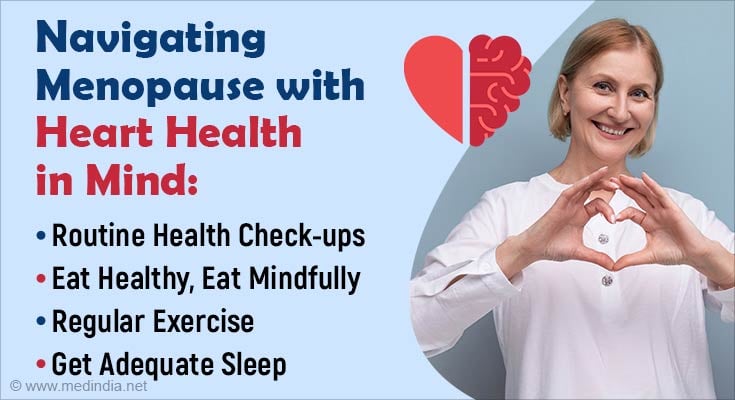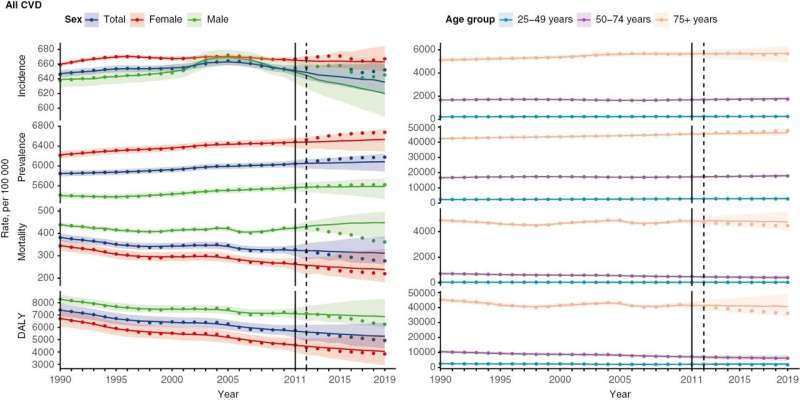Types
There are more than 60 different forms of heart disease. Here are the most common ones found among people all over the world.
1. Coronary heart disease:Coronary heart disease is also called coronary artery disease. It affects or damages coronary arteries that supply blood to the heart.
2. Cardiomyopathy: Cardiomyopathy is a condition in which the heart muscle that helps to pump blood throughout the body becomes weak.
3. Congenital heart disease: It is a defect (structural of functional) found in the hearts of individuals, right at the time of birth.
4. Arrhythmia: It a condition causing irregular heartbeat due to improper electric impulses received by the heart. It can either cause the heart to beat very fast (tachycardia) or very slow (bradychardia)
5. Congestive heart failure: Heart failure occurs when the heart is unable to pump blood throughout the body effectively. Congestive heart failure occurs when excess fluid builds up in the body because of heart failure.
6. Atrial fibrillation: It occurs due to rapid and irregular electrical impulse originating from the upper chamber of the heart .
7. Heart inflammation (myocarditis and pericarditits): The heart tissue can get inflamed due to a viral infection of the heart.
8. Myocardial infarction: It is a medical complicated term used for heart attack, when the blood supply to part of heart is completely blocked due to narrowing of blood vessels.
Causes And Risk Factors
Well, every type of heart disease will have its own set of causes and risk factors but, by large, the cause of heart disease lies in malfunctioning of the blood vessels, heart muscle or electric impulses signalling the heart, as mentioned above. Here are some modifiable and non-modifiable risk factors that can lead to heart disease:
1. Family history: If you have a relative who is suffering from a heart disease, you’re likely to suffer from the condition. The risk is higher if any of your immediate relatives have had a heart attack before the age of 55 years.
2. Age: Age is a major risk factor for heart disease (CVD). The lifetime risk factor is high for both men at women at the age of 40 years. But, women should worry about age as a risk factor at 55, provided all other risk factors are controlled.
3. Gender: Women, on an average, suffer from heart disease approximately 9 years later than men but the progression is faster in them as compared to men.
4. Ethnicity: Genetic differences and environmental factors play a role determining lifetime risk factor for heart disease. Indians are at a high risk but the risk is higher in Americans Indians as compared to Indians.
Here are some modifiable risk factors that can be controlled to reduce the risk of heart disease.
1. High blood sugar: People with diabetes have three times higher risk of suffering coronary heart disease or stroke and a four times greater risk of dying due to heart disease.
2. Hypertension: Hypertension means increased blood pressure on the walls of the arteries. If not controlled properly, this increased pressure can cause thickening of the blood vessels.
3. Smoking: If you smoke you’re twice likely to suffer from heart disease than people who don’t smoke. The risk further varies with the duration and frequency of smoking.
4. High cholesterol: When the blood level of bad cholesterol (LDL) is high, cholesterol gets deposited on the walls of the arteries and blocks arteries restricting the blood flow resulting in heart disease.
5. High triglyceride level: In India, high level of triglycerides is a big concern and also determines your overall risk of heart disease.
6. Obesity: If you’re overweight, you are 6 times more likely to suffer from heart disease. Obesity is linked to most of the other risk factors of heart disease.
Here are few more risk factors of heart disease
Symptoms
Heart disease is a silent killer as it progress slowly and is symptomless during the initial stages. But a person could start developing heart disease at a very young age and show the symptoms not before reaching 50s or 60s.
Again the signs or symptoms of heart disease may not be the same for every type. Here are the most common signs associated with heart disease.
1. Shortness of breath (dyspnoea): Breathlessness is commonly experienced by patients with heart failure. It is also a warning sign of heart attack.
2. Chest pain: Chest pain (angina) is a classic symptom of heart attack and coronary artery disease (CAD). In some cases, chest pain is associated with inflammation of the tissue covering the heart (pericardium).
3. Swelling of feet: Swelling in the feet and ankles is seen in people with congestive heart failure where the blood pumping capacity of the heart reduces.
4. Cold sweat: A person who is likely to get a heart attack sooner may start sweating profusely without any physical exertion.
5. Tiredness or fatigue: It is one of the common symptoms of heart failure and heart attack in women is unexplained overall weakness and fatigue. Fatigue is also common in the elderly population or people with diabetes who suffer from heart disease.
Here are 8 common heart disease symptoms and warning signs you should know
Diagnosis
Screening for heart function is a must, especially if you have non-modifiable risk factors that increase your susceptibility to heart disease. People who already have high cholesterol, triglycerides BP need to be extra careful and frequent with screening of heart function.
1. Blood test: Blood is the pool of several markers like blood sugar, fibrinogen level, C-reactive protein and lipids, pointing at your possibility of developing heart disease.
2. X-ray: Chest X-ray is a simple, useful imaging test for diagnosing a lot of heart conditions like congestive heart failure, enlargement of the heart and heart infections.
3. ECG: ECG or electrocardiogram is a useful test to assess heart rhythm and related heart conditions. It measures electrical activity of the heart.
There are many more heart function tests. Here’s detailed information about them: 8 tests that can tell if you have heart disease
Treatment
Lifestyle changes are diet medication form a major part of treatment of heart disease. But heart disease can be treated with medicines and surgical interventions depending on your condition.
Medicines for heart disease
There are several classes of drugs that help in treatment of heart disease depending on factors that pose a risk.
-
- Cholesterol lowering drugs (statins) help to reduce cholesterol, thereby preventing plaque formation leading to heart disease due to atherosclerosis.
-
- Anticoagulants (blood thinning agents) are prescribed to prevent clotting of blood and enlargement of existing blood clots.
-
- Diuretics are a class of drugs used to decrease fluid accumulation in the body. They are prescribed to patients with high blood pressure.
-
- Antiplatelet drugs like aspirin may be recommended to prevent blood clotting.
-
- Beta blockers are another class of drugs that are used to slow down the heart rate and lessen the contracting force with which the heart beats.
-
- Nitrates or nitroglycerin are usually prescribed to patients who have chest pain.
Surgical intervention
Due to improved healthcare and technology, heart disease can be well treated with heart surgeries. Here are some commonly used surgical treatments
-
- Angioplasty: It is the most common surgery performed to open up blocked arteries in patients with coronary heart disease with the help of a small device called stent. Here are indications, procedure, risks of angioplasty.
-
- Bypass surgery: In this surgery, a healthy blood vessel is used to form a bypass or another route for the the blocked arteries of the heart. This new blood vessel is called a graft and the proper name for the procedure is ‘coronary artery bypass graft surgery’
-
- Pacemaker implantation: A pacemaker may be implanted in patients with congestive heart failure or cardiomyopathy. Pacemaker is a tiny device that transmits electric signals to the heart muscle helping it to maintain a heart rate and rhythm.
-
- Heart transplant: Heart transplant is rarely performed because acquiring a healthy heart is difficult and matching the recipient is even more difficult. A healthy heart is normally obtained from a patient who is brain dead and implanted to a patient whose heart is irreversibly damaged.
Prevention
Although you cannot do anything about the non-modifiable risk factors, you manage controllable risk factors and easily reduce your overall heart disease risk.
1. Quit smoking: Even occasional or ‘social smoking’ is dangerous and increases the risk of heart disease. The good news is that no matter how long you have been smoking, you will feel better, and begin reaping rewards as soon as you kick the habit.
2. Eat healthy food: Eating healthy is a starting point of keeping heart disease at bay. Simple changes like switching to heart-healthy cooking oils, limiting salt and sugar can help prevent heart disease. Add more fresh fruits and vegetables to your diet.
3. Avoid leading a sedentary lifestyle: Exercising daily is a must, even if it is for 30-45 min. Regular physical activity helps you control your weight and reduce your chances of developing conditions such as high blood pressure, high cholesterol and diabetes, which may put a strain on your heart.
Here are more expert tips to prevent heart disease
The content has been verified by Dr. Santosh Kumar Dora, Cardiac Electro Physiologist, Asian Heart Institute, Mumbai.
More From Cardiovascular disease
Long Working Hours May Increase Risk of Cardiovascular Disease
Be aware of the potential health risks associated with long working hours. Prolonged working hours may increase risk of cardiovascular disease.
Ankylosing Spondylitis: A Complex Disease That Can Cause Serious Heart Diseases
If someone has been diagnosed with ankylosing spondylitis, it is essential to monitor heart health and manage symptoms with immediate medical care.
Early Age Cardiovascular Risk Sign
How To Prevent Early Cardiovascular Risk: Signs, Screening, And Habits
Early Cardiovascular Diseases: Symptoms, Diagnosis And Prevention.
Women’s Reproductive Health Decides The Cardiovascular Risk: See How
As a woman gets near her menopause, the levels of estrogen start to fall. The hormone has many protective functions such as cholesterol regulation.
8 Tips To Improve Cardiovascular Health
The American Heart Association (AHA) recommends people to follow Life’s Essential 8 to improve cardiovascular health and reduce risk of cardiovascular disease. It says:
Dietary Supplements That Are Good And Bad For Your Cardiovascular Health
A new study has cautioned that not all antioxidant supplements are good for your heart and some may even have a negative effect.
Raju Srivastava Suffers Cardiac Arrest At Gym: Doctor Shares Rules To Follow On Treadmill For Heart Health
Are you a fitness freak? Then this article will help you understand when to draw the line when trying to stay fit.
Cardio Metabolic Disorders
Sleeping With Lights On For Years? Studies Show Risk Of Cardio-Metabolic Disorders
Personal preference, fear of darkness, fear of falling and others might be reasons why some people like to sleep with lights on at night
Sleeping For Less Than Five Hours In Your 50s? You Might Be At Risk Of Developing Chronic Illness, Suggests Study
The study found that those who slept for five hours or less around the age of 50 were at 30 per cent more risk of developing multiple ailments than those who slept for seven hours
Cardiac Deaths In Festival Season: Hanuman Dies on Stage, Father-Son Duo Collapses After Garba Event
The man dressed up as Hanuman, carrying a fancy, long winding tail and doing an energetic body movement on stage. Suddenly, in matter of seconds, the man falls off the stage and collapses
Climate Change, Body Weight and Heart Failure: Study Finds Some Connection
The study looked at the effects of heat waves that affected Europe in 2019. It found a strong association between temperature and body weight, with body weight dropping as the temperature rose
ECG on Your Smart-Watch? Can wearable health devices replace white coats
As per some reports, measurements coming from one’s body are as strong as those coming from these devices. However, both won’t be of any advantage to an average man who lacks a medical context to interpret these results
Why Is High Blood Pressure A Leading Risk Factor For Cardiovascular Disease?
Knowing Your Blood Pressure: How Can It Save You From A Heart Attack?
Missing Out On Sleep? You Are Probably Troubling Your Heart; Expert Explains the Connection
Clinical research over the years has shown an association between sleep deprivation with heart failure, arrhythmia and high blood pressure, says expert
Blood Circulation Pumping
Cardiovascular Fitness? Here’s A Training Plan For Beginners To Follow
Workout plan for beginners: How to keep your heart and blood circulation pumping?
What Are The Different Environmental Factors That Affect Heart Health?
Did You Know That Environmental Facets Can Impact Your Cardiovascular Health?
COVID-19, POTS And Coronasomnia: The Strange Connection Between These 3 Conditions
Symptoms usually appear when you stand up from a reclining position and you get some relief only when you sit or recline
Chronic Inflammation: All About This Silent Killer
Inflammation is not a disease in itself but usually a symptomatic manifestation of some health condition
Long Working Hours May Increase Risk of Cardiovascular Disease
Be aware of the potential health risks associated with long working hours. Prolonged working hours may increase risk of cardiovascular disease.
Ankylosing Spondylitis: A Complex Disease That Can Cause Serious Heart Diseases
If someone has been diagnosed with ankylosing spondylitis, it is essential to monitor heart health and manage symptoms with immediate medical care.
Early Age Cardiovascular Risk Sign
How To Prevent Early Cardiovascular Risk: Signs, Screening, And Habits
Early Cardiovascular Diseases: Symptoms, Diagnosis And Prevention.
Women’s Reproductive Health Decides The Cardiovascular Risk: See How
As a woman gets near her menopause, the levels of estrogen start to fall. The hormone has many protective functions such as cholesterol regulation.
Dietary Supplements That Are Good And Bad For Your Cardiovascular Health
A new study has cautioned that not all antioxidant supplements are good for your heart and some may even have a negative effect.
Raju Srivastava Suffers Cardiac Arrest At Gym: Doctor Shares Rules To Follow On Treadmill For Heart Health
Are you a fitness freak? Then this article will help you understand when to draw the line when trying to stay fit.
Cardio Metabolic Disorders
Sleeping With Lights On For Years? Studies Show Risk Of Cardio-Metabolic Disorders
Personal preference, fear of darkness, fear of falling and others might be reasons why some people like to sleep with lights on at night
Sleeping For Less Than Five Hours In Your 50s? You Might Be At Risk Of Developing Chronic Illness, Suggests Study
The study found that those who slept for five hours or less around the age of 50 were at 30 per cent more risk of developing multiple ailments than those who slept for seven hours
Cardiac Deaths In Festival Season: Hanuman Dies on Stage, Father-Son Duo Collapses After Garba Event
The man dressed up as Hanuman, carrying a fancy, long winding tail and doing an energetic body movement on stage. Suddenly, in matter of seconds, the man falls off the stage and collapses
Climate Change, Body Weight and Heart Failure: Study Finds Some Connection
The study looked at the effects of heat waves that affected Europe in 2019. It found a strong association between temperature and body weight, with body weight dropping as the temperature rose
ECG on Your Smart-Watch? Can wearable health devices replace white coats
As per some reports, measurements coming from one’s body are as strong as those coming from these devices. However, both won’t be of any advantage to an average man who lacks a medical context to interpret these results
Why Is High Blood Pressure A Leading Risk Factor For Cardiovascular Disease?
Knowing Your Blood Pressure: How Can It Save You From A Heart Attack?
Missing Out On Sleep? You Are Probably Troubling Your Heart; Expert Explains the Connection
Clinical research over the years has shown an association between sleep deprivation with heart failure, arrhythmia and high blood pressure, says expert
Blood Circulation Pumping
Cardiovascular Fitness? Here’s A Training Plan For Beginners To Follow
Workout plan for beginners: How to keep your heart and blood circulation pumping?
What Are The Different Environmental Factors That Affect Heart Health?
Did You Know That Environmental Facets Can Impact Your Cardiovascular Health?
COVID-19, POTS And Coronasomnia: The Strange Connection Between These 3 Conditions
Symptoms usually appear when you stand up from a reclining position and you get some relief only when you sit or recline
Chronic Inflammation: All About This Silent Killer
Inflammation is not a disease in itself but usually a symptomatic manifestation of some health condition
Depression, Anxiety, Stress Leading To Rise in Heart Diseases Among Younger Population
Take care of your mental health to reduce the risk of heart attack. Expert says depression, anxiety, stress are major reasons behind heart problems in younger people.






